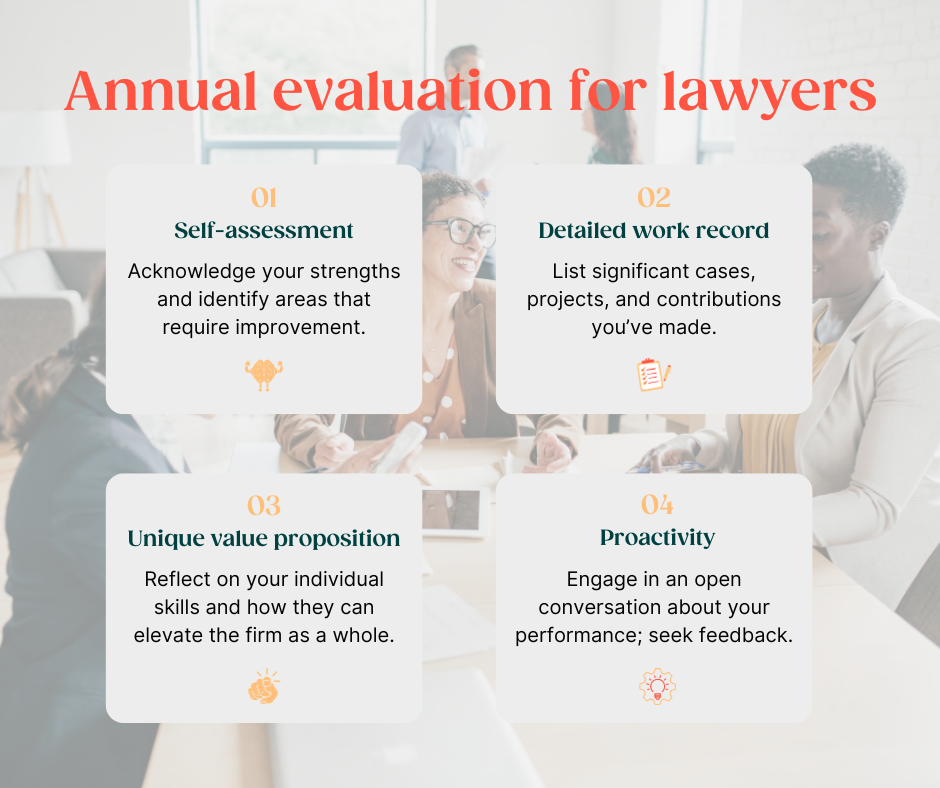Navigating your legal career: annual evaluation and promotions
You’ve put in the hard work this year, displaying dedication and expertise, and now, you stand at the precipice of recognition and advancement: your annual evaluation is coming!
As a legal professional, annual evaluations and promotions are pivotal milestones in your career. They signify recognition of your dedication and expertise, and they open doors to new opportunities and challenges. Yet, like any transformative journey, these events often come with their fair share of uncertainty and anxiety. What does your promotion mean exactly? How will your role and responsibilities evolve? What expectations will be placed on your capable shoulders?
Yearly evaluations, while a common practice in many professions, hold a distinct significance in the legal world. These performance reviews are not merely customary rituals but integral instruments for both individual growth and the overall health of a law firm.
Preparing for your annual evaluation: a step-by-step guide for lawyers
The annual evaluation process begins long before the actual meeting. Adequate preparation is essential for a constructive and productive evaluation. Here’s what you can do to ensure a well-prepared process:
Step 1: set well-defined goals
Begin your journey by defining your professional goals and expectations. Then think about how to express them to your manager to demonstrate your commitment to personal growth and your willingness to contribute to the overall team success. In order to articulate these goals with clarity and relevance to the company’s mission, you might want to outline specific, measurable, and achievable KPIs. Consider framing your goals in the context of how they contribute to the organization’s strategic priorities.
Step 2: conduct a comprehensive self-assessment
Continue by conducting a comprehensive self-assessment of your performance over the past year. Reflect on your accomplishments, areas of growth, and challenges you’ve successfully overcome. Objectivity is key; acknowledge your strengths and identify areas that may require improvement. This self-assessment serves as a foundational document for your forthcoming discussion with your supervisor or the evaluating committee.
Step 3: maintain a detailed work record
Throughout the year, maintain a detailed record of your work, with a focus on significant cases, projects, and contributions. These concrete examples of your achievements serve as valuable evidence of your contributions to the firm. Additionally, consider gathering feedback from colleagues and clients to complement your self-assessment.
Step 4: unlock your unique value proposition
To ascend the ladder of success, discern your unique value proposition. Reflect on your individual skills and experiences that set you apart. How can you leverage these distinctive attributes to elevate your team and the firm as a whole? This approach positions you as an invaluable asset while instilling a profound sense of purpose and direction in your work.
Step 5: initiate a proactive meeting with your supervisor
Proactivity is a hallmark of career success. Schedule a meeting with your supervisor well in advance of your evaluation. Engage in an open and candid conversation about your performance, and seek specific feedback on your strengths and areas for development. This dialogue should also clarify your role’s expectations and goals, demonstrating your commitment to growth within the firm.
Step 6: invest in self-improvement
Preparing for your annual evaluation is not just about retrospection; it’s also about looking forward. Identify areas where you can enhance your skills and competencies. Whether through specialized training, workshops, or mentorship, this commitment to continuous learning showcases your dedication to the firm’s success.

Open and honest communication
Transparent communication is the cornerstone of a successful evaluation. Both lawyers and supervisors should be encouraged to express themselves candidly during the discussion. Here’s how to foster open and honest communication:
- Active listening: encourage supervisors to actively listen to lawyers’ perspectives and concerns. Lawyers should also listen to constructive feedback with an open mind.
- Constructive feedback: providing and receiving feedback is an integral part of the evaluation process. Feedback should be constructive, specific, and aimed at growth.
Promotions: a matter of fairness
Promotions are often a major focus of annual evaluations. To ensure a fair and transparent promotion process, consider the following:
- Objective criteria: establish objective criteria for promotions, such as billable hours, successful case outcomes, client feedback, and leadership contributions. This helps avoid bias and ensures that promotions are based on merit.
- Clear feedback: if a lawyer is not ready for promotion, provide clear and specific feedback on what areas need improvement to reach the next level.
- Career development plans: work with lawyers to create individualized career development plans that outline the steps needed to reach the next level in their legal careers.
Understanding your new role and responsibilities
To thrive in your evolving legal career, equip yourself with a crystal-clear understanding of your new role and responsibilities. Proactively seek this information by arranging a meeting with your supervisor or the Human Resources department. Key questions should include:
- What specific tasks and projects will fall under your purview?
- Will you be responsible for managing a team or clients?
- How do your responsibilities align with the company’s overarching goals and objectives for this role?
Annual evaluations should not be a one-time event. Regular follow-up is crucial to track progress and ensure that the discussed goals and objectives are being met. Establish a system for ongoing feedback and support throughout the year.
Partnering with a Career Companion for legal professionals
As a career companion for lawyers, our agency is here to support you every step of the way. Whether you need guidance on evaluating your career options, negotiating a promotion, or addressing challenging work situations, we’re here to help. Seize the opportunity to take control of your legal career today.
Conclusion: charting your path
In summary, annual evaluations are an opportunity for growth, development, and mutual fulfillment. When conducted effectively, these evaluations can lead to stronger, more successful lawyers and law firms. By focusing on preparation, open communication, constructive feedback, fairness in promotions, work-life balance, training, and ongoing follow-up, lawyers and their firms can ensure that these evaluations serve as a catalyst for progress and prosperity.
Remember that annual evaluations are not just a formality; they are a chance to build a brighter future for lawyers and their legal practices. Embrace this process as a means to continuously improve, and you’ll find that the outcomes will be well worth the effort invested.
Looking for more career tips and market insights? Follow us on LinkedIn for the latest updates and guidance in the legal profession.
